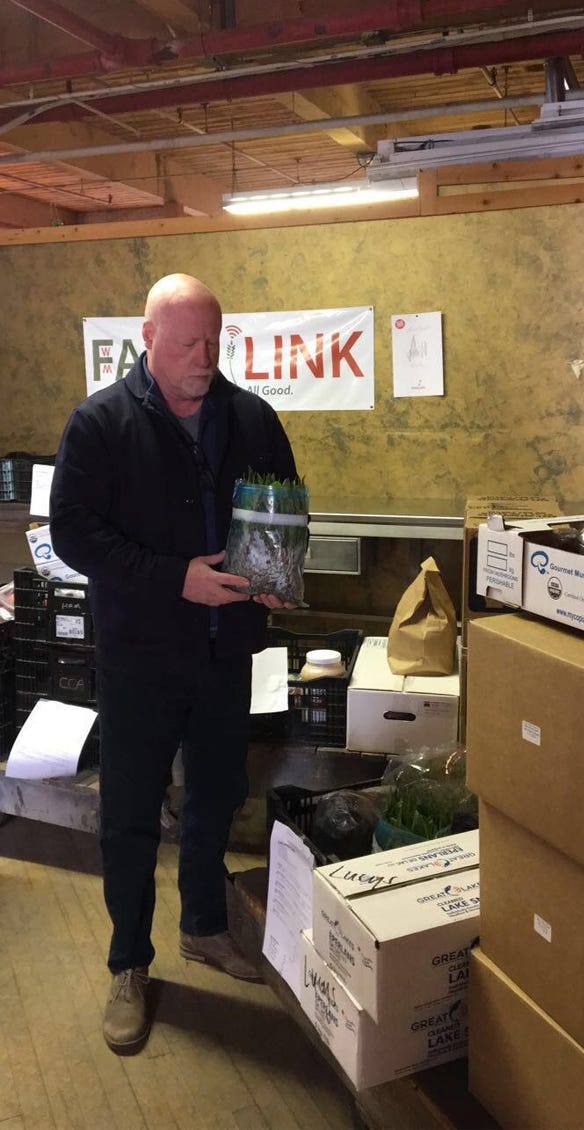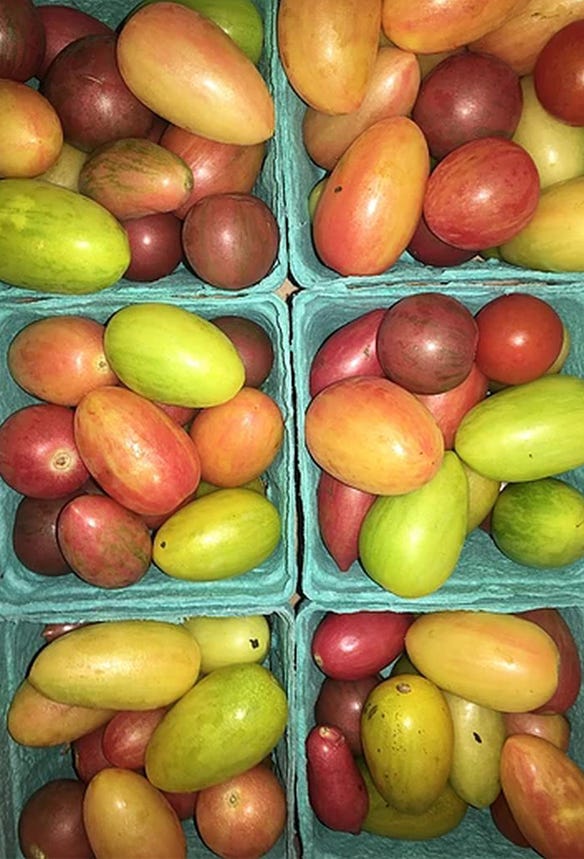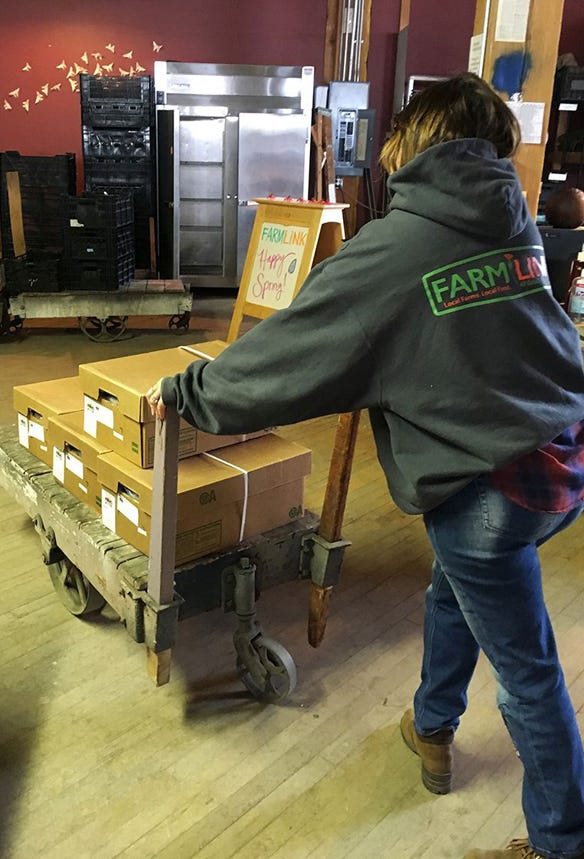April 24, 2018

Grand Rapids entrepreneur Jerry Adams says his 75 local farmers and producers have nothing to fear from the big-box supermarket delivery tsunami sweeping Michigan.
In fact, he’s expanding his FarmLink operation, which supplies local farm products to chefs in the state’s second-largest city, to include area households. The online service connects local growers with buyers.
Adams says he’s trying to differentiate himself from the supermarkets and their home delivery programs, as well as the meal kits that people are ordering. “We’re so focused on convenience now; I think we have given up logic,” he says. “That’s how bad things have become with food.”
For Adams and FarmLink, food logic is local and fresh. “We only sell local, which has come to define all of Michigan,” he says. “It’s self-policing in that it’s 95% how far a farmer will drive to deliver his product. We pretty well sell everything produced in Michigan. If there is a product we are not selling, I track it down and get it.”
Adams says he hears people talking about supermarket deliveries as if it is some kind of magical thing.

INSPECTION: FarmLink founder Jerry Adams checks out the first bunch of ramps for the season.

“There’s quite a lot of pseudo-education about food now, but it seems to me to be purely driven by convenience,” he says. “I hear, ‘Meijer has deliveries. So how are you different from them?’
“I’ll say I am only selling local food, so that’s my difference. Not the fact they are delivering food that can be from anywhere. I have nothing against Meijer.”
But Adams says there seems to be a disconnect, and that people now know where their food comes from and are searching for cheap product.
“What people don’t talk about is food worth,” he says, while questioning the meal-kit craze. “They get extremely small portions, and I think they pay too much. It doesn’t make any sense to me.”
Adams says there’s even a disconnect about organic.
“People say they buy organic, and I ask where it’s from and it’s imported. So, what problem have you solved by doing that?” he asks.
Adams says he’d rather buy a best-practices product from western Michigan that supports the local economy, travels a shorter distance, looks better and is more nutritious.
The food industry, he says, is experiencing a changing world.
“When I was doing the West Michigan Co-op 10 years ago, households were my audience,” Adams says.
“Several things have changed. The mindset of the buyers has changed; the audience has changed. People are more concerned about what they are putting in their bodies.”

FRESH PRODUCE: This is a sampling of garden fresh produce sold through FarmLink.
His attention to fresh and local is paying off. Since its inception six years ago, sales have almost doubled every year. And he doesn’t see the big-box home delivery movement impacting him.
“I haven’t lost a customer,” he says. “I think the people who are buying from me know the product is better; they know where it is from.”
FarmLink procedure
FarmLink kicks into operation each Thursday. Farmers list their products, how much they have and set their prices on the website. At 7 p.m., Adams locks the farmers out and opens the site to buyers.
Chefs and households can order until 6 p.m. Sunday.
Adams sends out emails touting sales — detailing what’s available, what’s hot, what’s new. There is inventory control on the website, and available product totals tick down as orders come in. It shows when a farmer has sold out of a product.
“A site-wide sellout doesn’t happen that often because the amount of product out there is really amazing. We also have multiple farms through which we can aggregate.”
With the 6 p.m. order freeze, the farmers see how much product they have moved. They use the platform to print their labels, harvest or prepare their product, and on Tuesday deliver it to the FarmLink office in a huge old-style brick building on the edge of downtown Grand Rapids.
“I call the website a portal, but it’s really a platform,” Adams says. “It’s the way farmers manage their side of the equation.”
Chefs and households have the choice of picking up their orders or having them delivered,
When he launched FarmLink, Adams didn’t have delivery trucks. Chefs had to pick up their orders.
Adams made it a social event. Over a few beers, chefs met their farmer-suppliers and relationships grew.
“We would have 10, 15 chefs wander in; farmers hanging out,” he says
He soon realized, though, this was a limiting factor in the business, which now has two delivery trucks that potentially deliver twice a week.
The decision to start household deliveries was spurred by the closure of the nonprofit West Michigan Co-Op, which Adams started and ran for 14 of its 20 years. When he started FarmLink, he deliberately excluded households to not hurt the co-op. Its closure left him an opening.
“Essentially, I wanted my mommies back,” he says. “I wanted the families that I had sold to with the co-op.
“It happened at the end of the season [last year], so I couldn’t really push the fresh stuff,” he says.
“I knew housewives were going to be a slow build. I wasn’t exactly sure how to strategize that. I’m spreading the word through social media; that plays a much bigger role now. I used to just have people sign up on the website.”
One of the suppliers impacted by the end of the co-op is S&S Lamb, an efficient multi-species farm operated by Pierre and Sharon Schierbeek in McBain, 110 miles north of Grand Rapids
“We use FarmLink for restaurant orders,” Sharon says. “Pierre delivers there every Wednesday if someone places an order for lamb. We have not seen any increase in orders from households and/or individuals yet.”
But Sharon says their business did start its own monthly delivery and online order system, which has helped keep some of the old customers.
“Even with that, I feel we lost probably half of what the cooperative had been buying from us,” she adds. “There are so many options out there now that it's difficult not to lose some to the newest thing.”
Work in progress
Adams agrees drawing the households in is a work in progress.
“For me it’s a prod to get the word out; it’s local and its quality,” he says. “Right now, we are delivering orders over $50 for free to Grand Rapids, Eastown and East Grand Rapids because that is my target audience.”
Adams says his job is somewhat like farming; he never knows what’s going to happen the next day.
“The biggest struggle for me in running an online business is you lose that human touch. You don’t get to see the buyers,” he says.
If FarmLink is working at its most efficient, buyers handle their own purchases; farmers handle their own listings. “I stay out of it.” As for an order, “it comes in; it goes out,” he says.

ON ITS WAY: Felicia Wozinski starts a delivery.

He remembered that when he ran the co-op, once a month there was a gathering that would attract as many as 300 families to meet the farmers.
Now, on the first Tuesday of every month, he’s holding the same thing for chefs, households and farmers. He’s worked with several brew pubs, which all donate beers. “Chefs come in because we’re targeting the same audience. The restaurants I sell to want to meet the householders and talk about how their restaurants are using FarmLink, and the household food buyers want to learn more about the food. We’ll do chef demos. It’s bringing all the foodies into the same room. I’ve got great chefs standing there; the farmers and now the consumers are in the mix,” he explains.
The next move for Adams is to commercialize the platform in other markets. Leasing the model is his next step. “The model had always been stupid simple, but we went back to the drawing board, looked at our software, beefed it up,” he says. “We really invested a lot of money, time and effort into making it the best it could be. We are at the tail end of that process.”
Potential customers are farmers markets that could do additional sales online.
“I can go anywhere and plant another FarmLink. It would be a stand-alone entity. The operators would have their restaurant chefs, households and farmers. I could host the site from here, take a couple of points off their sales. They would run their own business.”
A banker friend looked at the business and called it amazing. “You turn a profit every single week,” the banker said. “You know what you’ve sold before the physical transaction actually happens.
“You know your profits before anything even happens.”
And, Adams says, it’s all from fresh thinking about thinking fresh.
Harman writes from Brighton, Mich.
About the Author(s)
You May Also Like




